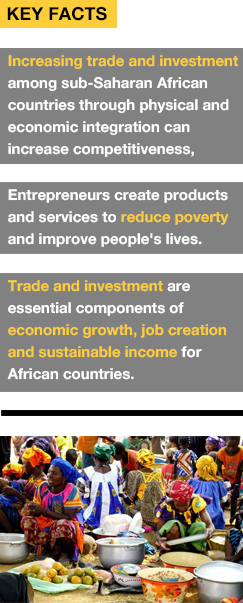
 |
|
 |
 |
 |
 |
 |
 |
 |
| What We Focus On | |||||
Business & Markets |
 |
|||
| The combination of entrepreneurship and technological innovation can forge an environment that is conducive to further poverty reduction. Social entrepreneurs use business principles to implement social innovations. Business leaders, who are successful in their own fields, can bring their experiences and skills to solve social problems. For example, a successful physician may organize fellow doctors to provide health services to the poor population in rural areas at no or minimal cost. Instead of seeing the poor as victims or a burden to society, these entrepreneurs recognize them as potential consumers of their products and services. Such recent attempts by corporations to combine business objectives with social concerns, as they are called social entrepreneurship, are emerging as a promising approach to international development. Business-minded public sectors are another way of improving the poor’s lives. Recent experiences have shown that introducing an entrepreneurial spirit into the development process can improve the effectiveness of intervention programs. An example is the capacity building projects for sub-Saharan Africa that have been carried out by UNDP since 2010. These projects aim to increase agricultural productivities in impoverished regions of Africa, and suggest a new methodology to build regional capacities, around the United Nations, and a vast network of social entrepreneurs, and development specialists, who share field experiences and knowledge crucial for economic resilience in rural communities. The capability to export products, particularly value-added products like processed foods, apparel, and other manufactured products to regional and international markets can be a vital source of income for many sub-Saharan African countries. Improving access to the markets in developed countries, enhancing aid for trade in order to help countries address supply-side constraints and improve competitiveness, investing in infrastructure, increasing capital investment flows, and strengthening regional economic integration can strengthen foreign trade in Africa, and ultimately strengthen the economy. Business and market will bring economic benefits to the developing world, although construction of basic infrastructure is a pre-requisite for starting businesses. It is also important to ensure that all transactions are completed under fair conditions, by keeping an eye on regulations in the market and trading system. |
 |
|||
|
GP3 Korea 2013. Creative Commons Attribution-Non Commercial-ShareAlike 2.0 License The Global Poverty Public Awareness Project in Korea. Designed by Jeong-ae Lee, Ranhee Kim, Suk-hwan Lim, Jaewoo Choi, Ji-won Oh & Seung-won Baek |